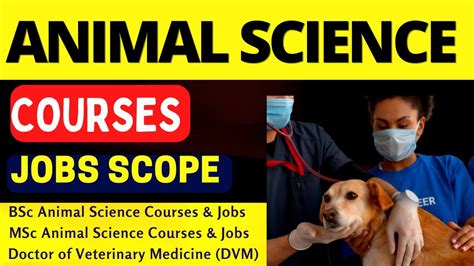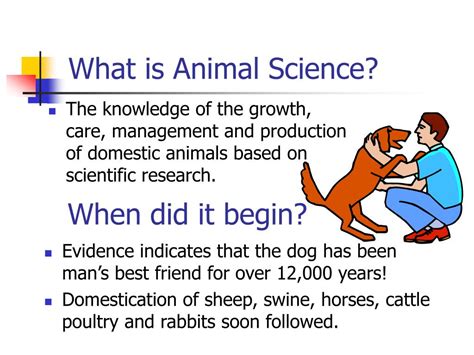Careers With Animal Science Degree

The field of animal science is an exciting and diverse discipline that opens doors to a wide range of career paths. With a degree in animal science, individuals gain a solid foundation of knowledge in animal biology, nutrition, behavior, and management, preparing them for various roles in agriculture, research, conservation, and more. This article explores the numerous career opportunities available to those with an animal science degree, highlighting the specific skills and expertise required in each field.
Veterinary Medicine and Animal Health

One of the most well-known career paths for animal science graduates is veterinary medicine. Veterinarians play a crucial role in maintaining the health and well-being of animals, ranging from companion pets to livestock and exotic species. A degree in animal science provides an excellent starting point for those aspiring to become veterinarians, offering a strong understanding of animal physiology, anatomy, and disease prevention.
In the realm of veterinary medicine, professionals can choose to specialize in various areas, such as:
- Small Animal Practice: Focusing on the treatment and care of companion animals like dogs, cats, and small mammals.
- Large Animal Medicine: Working with livestock, including cattle, horses, and pigs, to ensure their health and productivity.
- Equine Veterinary Medicine: Specializing in the unique needs of horses, covering areas like performance horse care and reproductive management.
- Avian and Exotic Animal Medicine: Providing care for birds, reptiles, and other exotic pets, which often requires a deep understanding of their specific biological needs.
In addition to veterinary practice, animal science graduates can also pursue careers in:
- Veterinary Technology: Assisting veterinarians in clinical settings, performing diagnostic tests, and providing nursing care.
- Animal Health Research: Conducting research to advance the understanding of animal diseases, develop new treatments, and improve overall animal health.
- Animal Nutrition and Feed Development: Formulating diets and supplements to optimize animal health and performance, often in collaboration with feed manufacturers.
Animal Agriculture and Production

Animal science plays a vital role in the agricultural industry, contributing to the efficient and sustainable production of animal-based food products. Graduates with an animal science degree are well-equipped to manage and optimize animal agriculture systems.
Key roles in animal agriculture include:
- Animal Husbandry and Farm Management: Overseeing the day-to-day operations of farms, ensuring the health, well-being, and productivity of livestock.
- Ranching and Livestock Management: Managing extensive livestock operations, including breeding programs, herd health, and pasture management.
- Dairy Farming and Milk Production: Focusing on the specialized care and management of dairy cattle to optimize milk production and animal welfare.
- Meat Science and Processing: Working in meat processing facilities to ensure food safety, quality, and optimal use of animal products.
Animal science graduates can also contribute to the industry through:
- Animal Nutrition and Feedstuffs: Developing and optimizing diets for livestock, taking into account nutritional requirements and economic considerations.
- Animal Breeding and Genetics: Utilizing advanced genetic techniques to improve livestock traits, such as disease resistance, productivity, and meat quality.
- Animal Welfare and Ethics: Advocating for and implementing practices that promote the ethical treatment of animals in agricultural settings.
Conservation and Wildlife Management
For those passionate about protecting and conserving wildlife, an animal science degree offers a solid foundation. Conservation and wildlife management careers focus on preserving biodiversity and ensuring the sustainability of natural resources.
Potential career paths in this field include:
- Wildlife Biologist: Studying and managing wildlife populations, habitats, and ecosystems to ensure their long-term survival.
- Zoologist: Researching and working with animals in captivity, often in zoos or wildlife parks, to understand their behavior, reproduction, and conservation needs.
- Conservation Scientist: Developing and implementing strategies to conserve natural resources and protect endangered species.
- Environmental Consultant: Providing expertise on environmental impact assessments and advising on sustainable practices in various industries.
Animal science graduates can also make a difference in conservation through:
- Wildlife Rehabilitation: Caring for injured or orphaned wildlife with the goal of releasing them back into their natural habitats.
- Wildlife Management and Control: Managing wildlife populations to prevent conflicts with human activities and ensure the balance of ecosystems.
- Ecotourism and Education: Working in eco-tourism businesses or educational institutions to raise awareness about conservation and promote sustainable practices.
Research and Academia
Animal science research is a critical field that drives innovation and advances our understanding of animal biology, behavior, and welfare. Researchers in this field contribute to various areas, including:
- Animal Behavior and Welfare: Studying animal behavior to improve their living conditions and ensure their psychological well-being.
- Animal Nutrition and Physiology: Investigating the nutritional requirements of animals and the physiological processes that impact their health and productivity.
- Reproductive Biology: Researching reproductive strategies and technologies to enhance breeding programs and improve animal genetics.
- Food Safety and Quality: Ensuring the safety and quality of animal-derived food products through research and development.
Animal science graduates interested in research and academia can pursue careers as:
- Research Scientists: Conducting independent research, often in collaboration with universities or research institutions.
- University Professors: Teaching animal science courses and contributing to research initiatives within academic institutions.
- Technical Writers and Communicators: Translating complex research findings into accessible content for various audiences, including the public, industry professionals, and policymakers.
Animal Training and Behavior

Understanding animal behavior is a critical aspect of animal science, and graduates with a passion for this field can pursue careers in animal training and behavior consulting.
Potential roles include:
- Animal Trainer: Working with a variety of species, from companion animals to marine mammals, to teach specific behaviors for entertainment, assistance, or conservation purposes.
- Behavior Consultant: Providing expertise to pet owners, shelters, and other animal care facilities to address behavior issues and improve animal welfare.
- Zoo and Aquarium Curator: Managing the care and behavior of animals in captivity, ensuring their well-being and providing engaging experiences for visitors.
- Animal Assisted Therapy: Utilizing animals in therapeutic settings to improve the physical, social, and emotional well-being of individuals, often in collaboration with healthcare professionals.
Animal-Related Business and Industry
Animal science graduates can also find fulfilling careers in the business and industry sectors, where their expertise is highly valued.
Possible career paths include:
- Animal Feed and Nutrition Sales: Working for feed manufacturers or agricultural supply companies to promote and sell animal nutrition products.
- Animal Health Product Sales: Representing pharmaceutical companies that produce medications, vaccines, and other animal health products.
- Animal Biotechnology: Contributing to the development and commercialization of innovative products and technologies in the animal health and agriculture sectors.
- Animal Product Marketing and Sales: Working in the marketing and sales of animal-derived products, such as meat, dairy, and leather goods.
Animal science graduates can also contribute to the business side of the industry through roles in:
- Agribusiness Management: Overseeing the business operations of agricultural enterprises, ensuring profitability and sustainability.
- Animal Insurance and Risk Management: Providing insurance and risk management services to protect farmers and livestock owners against financial losses.
- Animal Welfare Advocacy and Policy: Advocating for animal welfare standards and influencing policy development at local, national, and international levels.
Conclusion
A degree in animal science opens doors to a multitude of exciting and impactful career paths. Whether it's caring for animals in veterinary medicine, contributing to sustainable agriculture, conserving wildlife, advancing research, or working in business and industry, animal science graduates have the opportunity to make a difference in the lives of animals and the world at large. With a strong foundation in animal biology, behavior, and management, the possibilities are endless.
What are the educational requirements for becoming a veterinarian?
+Becoming a veterinarian typically requires completing a Doctor of Veterinary Medicine (DVM) program, which usually takes four years after obtaining a bachelor’s degree. Some DVM programs may consider applicants with only a high school diploma, but a bachelor’s degree in animal science or a related field is highly recommended to meet the prerequisites for veterinary school.
Can animal science graduates work in the zoo industry without a zoology degree?
+Absolutely! While a zoology degree may be beneficial, it is not a strict requirement for working in the zoo industry. Animal science graduates with a strong interest in zoology and wildlife conservation can pursue careers as zoo keepers, animal curators, or even work in research and education within zoos. Many zoos value the expertise and knowledge that animal science graduates bring to the table.
What are the salary prospects for animal science graduates in different career paths?
+Salary prospects can vary widely depending on the specific career path chosen. For instance, veterinarians often enjoy competitive salaries, especially in specialized fields. Animal agriculture and production roles may offer good compensation, especially for those with management responsibilities. Conservation and wildlife management roles may have more varied salary ranges, but the work is often driven by passion and a desire to make a difference.
Are there opportunities for animal science graduates to work internationally?
+Absolutely! Animal science graduates can find opportunities to work internationally in various fields. For example, veterinarians may find work in developing countries, contributing to animal health and welfare initiatives. Conservationists can work on global projects to protect endangered species. Additionally, the agricultural industry offers international opportunities, especially in regions with strong livestock or agricultural sectors.



